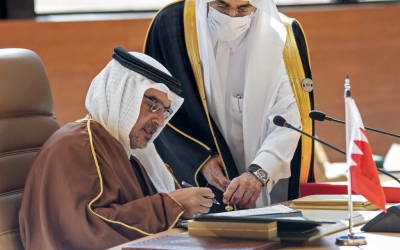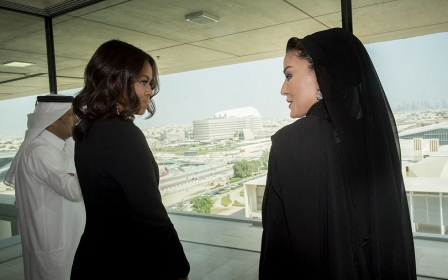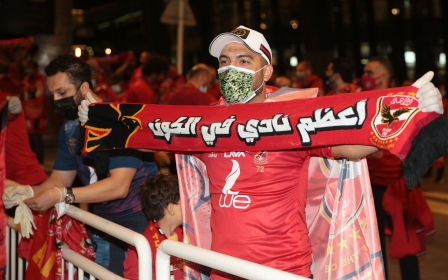US academic withdraws from Qatar research project over racism controversy

A US academic who became engulfed in controversy in Qatar has withdrawn from a $700,000 research project funded by a government-affiliated body following sustained criticism on social media.
On Tuesday, Northwestern University in Qatar (NU-Q) professor Jocelyn Mitchell withdrew from the research team, whose aim was to study "obstacles and successes of women entrepreneurship in Qatar" with funding from the Qatar National Research Fund (QNRF).
In 2008, Mitchell and her husband published a post on their personal blog titled "You know you're in Qatar if," which included a series of xenophobic and racist remarks. Mitchell deleted the post but it resurfaced in 2019, prompting widespread condemnation.
NU-Q is a partner university in the Qatar Foundation (QF) and is hosted in its Education City, an enclave of eight offshore western university campuses, along with the local Hamad Bin Khalifa University (HBKU).
When NU-Q announced that two of its professors, S Venus Jin and Mitchell, along with HBKU professor Mohamed Evren Tok, had received a $700,000 grant on 25 January, several Qatari academics took to Twitter.
New MEE newsletter: Jerusalem Dispatch
Sign up to get the latest insights and analysis on Israel-Palestine, alongside Turkey Unpacked and other MEE newsletters
On 2 February, the Doha Globe website published translations of a few tweets in Arabic, which raised a range of concerns, such as the exclusion of Qataris from the research team, the size of the fund for a "simple" project, and the project's benefits to Qatari society.
The key source of controversy, however, revolved around the allegations of racism stemming from Mitchell's blog.
On 4 February, Doha News carried screenshots of the 2008 listicle shared by Mitchell and reportedly written by a friend.
One could read that, in Qatar, "the ratio of ugly women to not so ugly women is 9:1" and that the only murders to take place in Qatar are when "an Indian construction worker sleeps with a Phillipino [sic] construction worker's wife".
The post also claimed that "your English gets progressively worse because complete sentences are simply too advanced for the locals".
The list ended saying: "Qatar is home to the largest US army bases in the Middle East, so, as long as you have a US passport, you're the big man on the campus." Qatar, Mitchell shared, "is great to work in for six months and then get the hell out".
The Doha News report concluded: "Almost 13 years on and not only is Mitchell still living in the country... but she is now being awarded hundreds of thousands of dollars to research the very same people she once ridiculed."
A recurring issue of racist comments
Mitchell announced her withdrawal through a statement on Tuesday, saying she would "not be a part of this research," adding that talks were on with the QNRF to decide on the grant. Some reports claimed that Mitchell's withdrawal was not voluntary.
Of her blog entry, she said: "These are racist and unrepresentative comments about Qatar, the Qatari people, and its expatriate communities, with no basis in reality, and it does not reflect how I feel about the diverse people who make up this tolerant and accepting country."
Stating that the content was written by someone else, she added: "I would never re-post such an email today, precisely because of how much I have learned and grown over my past 13 years living and working in Qatar."
"At the time I didn't recognise the racism of these words and ideas, or the racism of re-posting them," she added.
The controversial blog entry had surfaced twice, in 2015 and 2019, and on both occasions, she apologised. However, her past apologies were rejected several times, as some academics cited Mitchell as having coined terms such as "Qatarded," as an example of how "racism shouldn’t be normalised and rewarded".
'I didn't recognise the racism of these words and ideas, or the racism of re-posting them'
- Jocelyn Mitchell
Last week, researcher Reem al-Harmi said Mitchell's 2019 apology "fell short and was too little, too late" for the many people she insulted. She added that it came after Twitter users circulated her post and students at NU-Q staged protests.
Harmi said the professor's attempt to "pass off the blog post as someone else's opinion is simply unacceptable," and that "they reflected the thoughts of an individual who sees society and those around them through the lens of 'white privilege'".
On Monday, Mitchell's colleagues at NU-Q publicised the contents of an email they sent to the administration, in which they said they "encourage her to withdraw from the research team".
Call for reforms
Harmi pointed out that Mitchell had received "four different grants worth $1,080,357" in the space of "four years," include QNRF funding for a research project titled "In majaalis al-hareem: The complex professional and personal choices of Qatari women".
Harmi says the majlis culture is based on oral narration, and for any ethnographic study the researcher must be familiar with the "language and society they are studying".
"We do not want to return to the era of orientalists," she added.
"The QNRF must pledge reform to ensure grants are never awarded to racists or under-qualified researchers," said one of the activists who organised the online protest, who wanted to be identified only as a graduate of a QF-partner university.
"The multiple grants awarded to Mitchell and Dr Evren Tok show that the fund does not take into account important elements... such as the background of the researcher, biases and expertise," the activist told Middle East Eye.
"The Qatari people have witnessed again and again that western academics with questionable backgrounds in QF not only get away with their shameful behaviour but are also awarded grants to research the population they have biases against. This is not acceptable anywhere in the world, and the Qatari people don't deserve any less."
To avoid a situation similar to the controversy, Maryam Al-Khater, who holds a PhD in political communications from Australian National University, put forward several suggestions, including: background checks of a scholar for any prejudice; familiarity, if not mastery, of the language and culture in studies related to region or country; and the enforcement of academic ethics through disciplinary and ethics committees.
"We want QNRF to take a stance against institutional racism, no matter who commits it. There's a need to review its measures to protect it from any misconduct or conflict of interest," Khater told MEE.
The process behind grants
On Tuesday, the QF press office told MEE that it was not making any statement on the issue at this time.
To get a view of the process in awarding grants, MEE spoke to a Qatar-based academic who has experience with QNRF grant programmes though he has never worked for the fund.
'It would be a real shame if public concerns about a single participant... were to overshadow QNRF's great work'
- Qatar academic
"All proposals submitted to QNRF, and especially in the NPRP [National Priorities Research Programme], undergo very rigorous academic peer review, generally done by four to five reviewers from inside and outside Qatar," he told MEE on condition of anonymity because of past and ongoing research projects in Qatar.
"The reviewers' feedback is then made available to the research team after the review, with a score awarded based on the feedback. I believe the reviewers themselves do this scoring. Final QNRF funding decisions then follow directly from this scoring."
He showed MEE a "template" available on QNRF's website. One of the sections in the NPRP proposal template relates to the research team's qualifications and suitability.
"Final grant proposals run 30 to 35 pages and take months to prepare; so it's not a simple guaranteed cash machine for academics that they can apply for overnight. I've had lots of NPRP proposals rejected," he said.
The academic believes the QNRF is on par with the National Science Foundation in the United States.
"It would be a real shame if public concerns about a single participant in a single grant - out of the hundreds and thousands of grants awarded - were to overshadow QNRF's great work over this time," he said.
Bias and representation
Geoffrey Martin, a political science PhD candidate at the University of Toronto who now works as an economic analyst in Kuwait, told MEE: "I think the structure of QNRF's review process, like most such research institutions, is probably pretty rigorous. The issue in such institutions is the reviewers themselves.
"As has been noticed by various students and commentators at NU-Q, the biggest flag is that there are no single Qatari national women on a project about Qatari national women in entrepreneurship," he added. "That is a red flag in the review process. There are at least a dozen capable candidates that could have filled those roles. This speaks to the larger issue in higher education, of institutional barriers to diversity and inclusivity."
Asked whether this will adversely affect the Qatari institution, he said: "The discussion that led to Mitchell's withdrawal, with NUQ faculty's support, is a clear sign that institutions can learn. Although what was far more important is the lobbying which led to the change.
"The QNRF is rightly highly respected. This won't change that. All institutions need to adapt to social change and pressures," Martin added, saying he thought the outcome of the controversy was positive.
Middle East Eye delivers independent and unrivalled coverage and analysis of the Middle East, North Africa and beyond. To learn more about republishing this content and the associated fees, please fill out this form. More about MEE can be found here.





